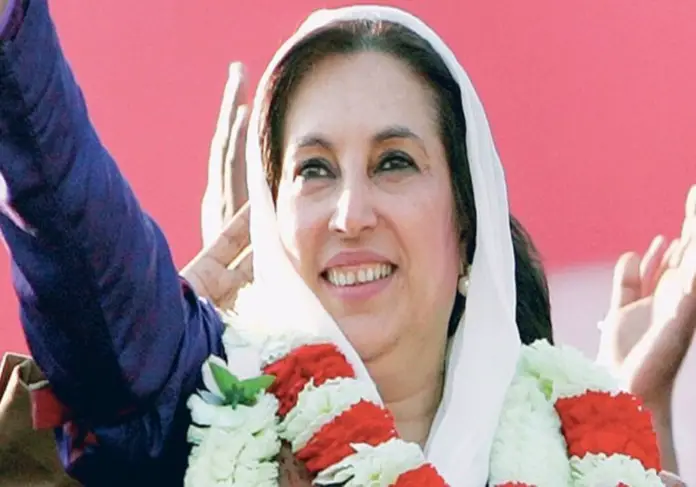It was December 27, 2007, when Pakistan endured a devastating loss. Today marks the 14 years of the murder of the democratic order.
“I want to see a prosperous, progressive and developed Pakistan,” said Benazir Bhutto before taking the flight to Pakistan. Though she is no longer with us, Benazir Bhutto’s remarks represent her vision and hope for Pakistan.
History will never forget the gory day when after addressing a big public gathering in Rawalpindi’s Liaqat Bagh this day in 2007, Mohtarma Shaheed Benazir Bhutto and her party workers were assassinated and the voice of Pakistan’s underprivileged and oppressed people was eternally silenced.
Benazir Bhutto was a well-liked and revered leader, a Pakistani leader who was acknowledged and respected around the world. Pakistan is a country with a history of assassinations, executions, and war, and yet Benazir’s assassination remains a startling act. Some weeks before she was assassinated, BB indicated her intention to fight the establishment. Talking to senior journalist Hamid Mir at her residence a few days before her assassination, she said, “Let me tell you today, very clearly, that they have already decided to kill me and they will kill me soon. After they do, they will blame the Taliban or al Qaeda. But you must name Musharraf as my assassin.”
BB had done her homework before returning since she was certain her days were numbered. She wrote to Mark Siegel, a trustworthy American friend, that Musharraf would be her assassin. In the possibility of another assassination attempt on Bhutto, he was directed to disclose the letter to international media. On December 27, 2007, he did the same. CNN reported just minutes after Benazir Bhutto’s killing that she had named Musharraf as her assassin.
Her strength was bravery. Later on, fearlessness became her weakness. Three different assassination attempts were attempted on her life between Oct. 18 and Dec. 27. Despite this, she went straight to the Jinnah hospital following the Karsaz incident to check on the injured workers’ health, and she did so without security. Peshawar was the scene of her second assassination attempt. The suspects were apprehended, but no one knows what happened to them to this day. Benazir was assassinated in the third attempt. Buried next to her father at Garhi Khuda Baksh and close to her two brothers, Mir Murtaza and Shahnawaz, Benazir Bhutto was like them; martyred by those who loved power more than Pakistan.
Following the politically motivated assassination of her father, former Prime Minister Zulfikar Ali Bhutto, Bhutto inherited the reins of the Pakistan People’s Party (PPP) at a young age. Despite her young age, she has accomplished what most people only dare to dream about. In the 1990s, politics evolved as BB revived the PPP-style of taking politics to the streets and villages. Her rallies were a uniting force for the marginalized, the working class, religious minorities and ordinary women. In a short period of time, Bhutto rose from a patriarchal country to become a global symbol of women’s emancipation. She was the international face of Pakistan and the modern Muslim woman. She achieved a number of successes in her political career as the first female prime minister of the Muslim world, setting a standard for others and future generations to follow. In essence, she was a social democrat who was committed to the cause of the oppressed. She was never given enough opportunity to put her political ideas into action. She was unconstitutionally removed twice.
On the 14th anniversary of her death, we must consider whether we fully comprehended her ultimate sacrifice. Have the establishment’s overreaching powers, which have continuously plotted against her democratic values, been curtailed? Has democracy and its foundations been bolstered? Have the material and social conditions of Pakistanis improved? We must use this opportunity for self-reflection rather than mourning what we have lost. We must remember her powerful presence, her love for her motherland, her unwavering patience, and her day-by-day, step-by-step efforts to reclaim Pakistan.
Benazir Bhutto will go down in history as a feminist icon and the woman who toppled the country’s figurative glass ceiling.
Was she aware that her days were numbered? She had the option of returning to Dubai.
But one thing is certain: the Bhuttos never run away.
She will live on in the hearts of the millions of people who loved her now and always.







